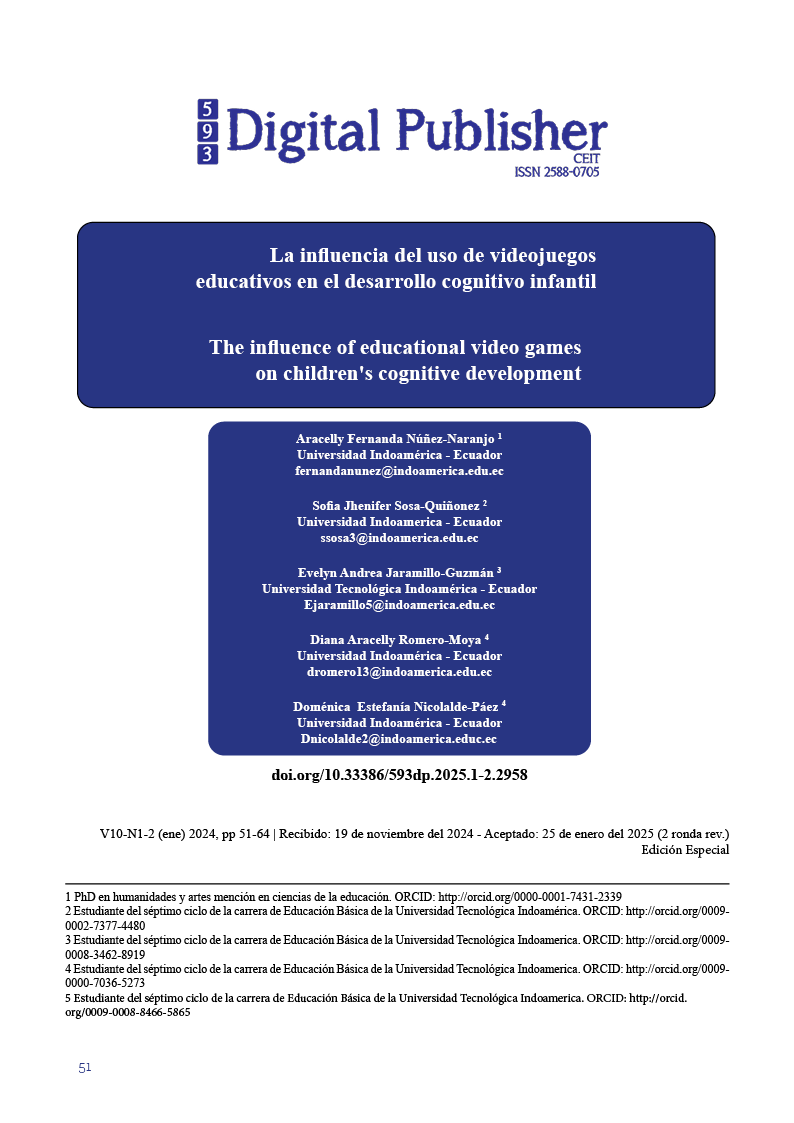The influence of educational video games on children's cognitive development
Main Article Content
Abstract
Introduction: This study examines the influence of educational video games on children's cognitive development, a topic of growing relevance in the digital era. Objective: The objective is to analyze how these video games can enhance key skills such as attention, memory, executive functions, and logical reasoning, while also assessing the risks associated with their improper use. Methodology: The study employs a critical review of existing research that supports these benefits and outlines best practices for their implementation in educational settings. Results: Key findings indicate that educational video games, when designed with pedagogical purposes, facilitate active learning through interactive play. Studies show that these games can significantly improve performance in various academic areas, such as mathematics and reading, by capturing attention and promoting problem-solving. However, excessive use may lead to addiction issues and limitations in social interaction. Conclusion: The study concludes that educational video games can be effective tools for children's cognitive development when used appropriately and under supervision. It is crucial for parents and educators to establish clear boundaries and complement this learning modality with traditional methods. The proposed recommendations aim to maximize benefits while minimizing risks, fostering a balanced approach that supports children's holistic learning in today's digital society.
Downloads
Article Details

This work is licensed under a Creative Commons Attribution-NonCommercial-ShareAlike 4.0 International License.
1. Derechos de autor
Las obras que se publican en 593 Digital Publisher CEIT están sujetas a los siguientes términos:
1.1. 593 Digital Publisher CEIT, conserva los derechos patrimoniales (copyright) de las obras publicadas, favorece y permite la reutilización de las mismas bajo la licencia Licencia Creative Commons 4.0 de Reconocimiento-NoComercial-CompartirIgual 4.0, por lo cual se pueden copiar, usar, difundir, transmitir y exponer públicamente, siempre que:
1.1.a. Se cite la autoría y fuente original de su publicación (revista, editorial, URL).
1.1.b. No se usen para fines comerciales u onerosos.
1.1.c. Se mencione la existencia y especificaciones de esta licencia de uso.
References
Acurio, B., & Nuñez, A. (2019). Creo, juego y aprendo con estrategias y recursos para mejorar la comprensión lectora. 593 Digital Publisher CEIT, 44-59. https://doi.org/10.33386/593dp.2019.2.87
Cadena-Zambrano, V., & Nuñez-Naranjo, A. (2020). ABP: Estrategia didáctica en las matemáticas. 593 Digital Publisher CEIT, 1(5), 69–77. https://doi.org/10.33386/593dp.2020.1.184
Chappell, D., Eatough, V. E., Davies, M. N. O., y Griffiths, M. D. (2018). Ever Quest-It's just a computer game right? An interpretative phenomenological analysis of online game addiction. International Journal of Mental Health and Addiction, 4, 205-216. doi: 10.1007/s11469-006-9028-6.
Chiu, S., Lee, J., y Huang, D. (2024). Video Game Addiction in Children and Teenagers in Taiwan. CyberPsychology & Behavior, 7, 571-581. doi: 10.1089/cpb.2004.7.571
Chóez-Napa, K. I., & García-Murillo, G. (2022). Recursos educativos digitales en el proceso de aprendizaje de las matemáticas en educación básica superior. EPISTEME KOINONIA, 5(1). https://doi.org/10.35381/e.k.v5i1.1818
Farfán-Carrión, W. J., & Mestre-Gómez, U. (2023). Estrategia metodológica para el uso de recursos digitales en el aprendizaje significativo de las Matemáticas en el quinto grado de Educación General Básica. MQRInvestigar, 7(2). https://doi.org/10.56048/mqr20225.7.2.2023.515-532
Flores, R. J. J., & Cotrina, D. M. C. (2024a). La motivación en el aprendizaje durante la última década. Horizontes. Revista de Investigación en Ciencias de la Educación, 8(32), 380-392. https://doi.org/10.33996/REVISTAHORIZONTES.V8I32.730
Flores, R. J. J., & Cotrina, D. M. C. (2024b). La motivación en el aprendizaje durante la última década. Horizontes. Revista de Investigación en Ciencias de la Educación, 8(32), 380-392. https://doi.org/10.33996/REVISTAHORIZONTES.V8I32.730
Gabarda Méndez, V., Marín Suelves, D., & Romero Rodrigo, M. M. (2021). Evaluación de recursos digitales para población infantil. EDMETIC, 10(1). https://doi.org/10.21071/edmetic.v10i1.13125
Gallo, G., Cañas, A., & Campi, J. (2021). Aplicaciones de las TIC en la educación. Reciamuc, 5(2), 45-56.
Gentile, D. A. (2019). Pathological video-game use among youth ages 8 to 18: A national study. Psychological Science, 20, 594-602. doi: 10.1111/j.1467-9280.2009.02340.x
Gil, J. P. E. (2019). Juego y gamificación: Innovación educativa en una sociedad en continuo cambio. Revista Ensayos Pedagógicos, 14(1).
Gutiérrez, A. (2021). La edad de las operaciones formales de Jean Piaget y el rendimiento académico en matemáticas. Ciencia Latina Revista Científica Multidisciplinar, 5(4), 5864-5882. https://doi.org/10.37811/cl_rcm.v5i4.728
Higueras, M. M. E. (2020). ¿Qué se entiende por juego didáctico? : aportaciones de maestros y estudiantes en prácticas sobre su concepción como elemento fundamental en el desarrollo del proceso enseñanza-aprendizaje. Redined, 24(1), 266-283.
Illescas, R. G. E. C. E. J. (2020). Aprendizaje Basado en Juegos como estrategia de enseñanza de la Matemática. Cienciamatria, 1(6), 533-552.
López Rodríguez, S. M. (2021). Competencias TIC para el desarrollo profesional docente. Revista Compás Empresarial, 12(33), 205-220. https://doi.org/10.52428/20758960.v11i33.160
Marco, C. & Chóliz, M. (2017). Eficacia de las técnicas de control de la impulsividad en la prevención de la adicción a videojuegos. Terapia Psicológica, 35(1), 57-69. Recuperado de http://dx.doi.org/10.4067/S0718-48082017000100006
Núñez Naranjo, A. F., Solano-Castillo, R. B., & López-Criollo, S. G. (2024). Estrategias metodológicas para la enseñanza de las ciencias sociales. Revista Científica Retos de la Ciencia, 8(18), 73-86. https://doi.org/10.53877/rc.8.18.20240701.7
Núñez-Naranjo, A., Cumbicus, F. C., & Ocaña, J. M. (2024). TIC as a Didactic Tool for the Development of Reading Comprehension (pp. 144–154). https://doi.org/10.1007/978-3-031-44131-8_15
Ortiz, D. J., & Velastegui, D. C. (2023). Dependencia a videojuegos y su relación con la impulsividad en estudiantes. LATAM Revista Latinoamericana de Ciencias Sociales y Humanidades, 4(1). https://doi.org/10.56712/latam.v4i1.330
Ortiz-Clavijo, L. F., & Cardona-Valencia, D. (2022). Tendencias y desafíos de los videojuegos como herramienta educativa. Revista Colombiana de Educación, 1(84), 1-17. https://doi.org/10.17227/rce.num84-12761
Peukert, P., Sieslack, S., Barth, G., y Batra, A. (2019). Internet- and computer game addiction: phenomenology, comorbidity, etiology, diagnostics and therapeutic implications for the addictives and their relatives. PsychiatrischePraxis, 3, 219-224. doi: 10.1055/s-0030-1248442
Rivas Proaño, R. S., & Párraga Valle, J. E. (2022). Estrategia didáctica con el uso de Recursos Educativos Digitales para la enseñanza-aprendizaje de las operaciones matemáticas básicas en el subnivel elemental. MQRInvestigar, 6(4). https://doi.org/10.56048/mqr20225.6.4.2022.863-875
Sandoval Romero, P. D., & Cisneros Quintanilla, P. F. (2022). Recursos didácticos virtuales y Storytelling como estrategias para reforzar la comprensión lectora. Religación. Revista de Ciencias Sociales y Humanidades, 7(34). https://doi.org/10.46652/rgn.v7i34.975
Saza, I. (2022). Ambientes virtuales y teorías de aprendizaje. Corporación Universitaria Minuto de Dios - UNIMINUTO.
Universidad de Cienfuegos «Carlos Rafael Rodríguez», S. P., & Castro Rozo, S. P. (2022). Ambientes de aprendizaje enriquecidos por las tecnologías de la información. Conrado, 18(85), 363-371. http://scielo.sld.cu/scielo.php?script=sci_arttext&pid=S1990-86442022000200363&lng=es&nrm=iso&tlng=en
Valenzuela, B. A., Lúgigo, M. G., De Los, R., Campa Álvarez, Á., Distrital, U., José, F., & Caldas, D. E. (2014). Recursos para la inclusión educativa en el contexto de educación primaria * Resources for Inclusive Education in the Context of Elementary Education. revistas.udistrital.edu.co, 13(2).
Vélez Bravo, P. E., & Santana Sardi, G. A. (2023). Guía metodológica para mejorar el uso de las TIC del docente en el proceso de enseñanza-aprendizaje de la Unidad Educativa “Rosa Herlinda Zambrano Ganchozo”. Tesla Revista Científica, 3(2). https://doi.org/10.55204/trc.v3i2.e211
Villamar, B. E. B., Valdez, Y. C. Z., Valdez, J. G. Z., Holguin, A. I. P., & Rodríguez, C. A. G. (2024). Desarrollo de las habilidades básicas mediante el juego: Un enfoque científico. Ciencia Latina Revista Científica Multidisciplinar, 8(4), 10665-10675. https://doi.org/10.37811/CL_RCM.V8I4.13211






